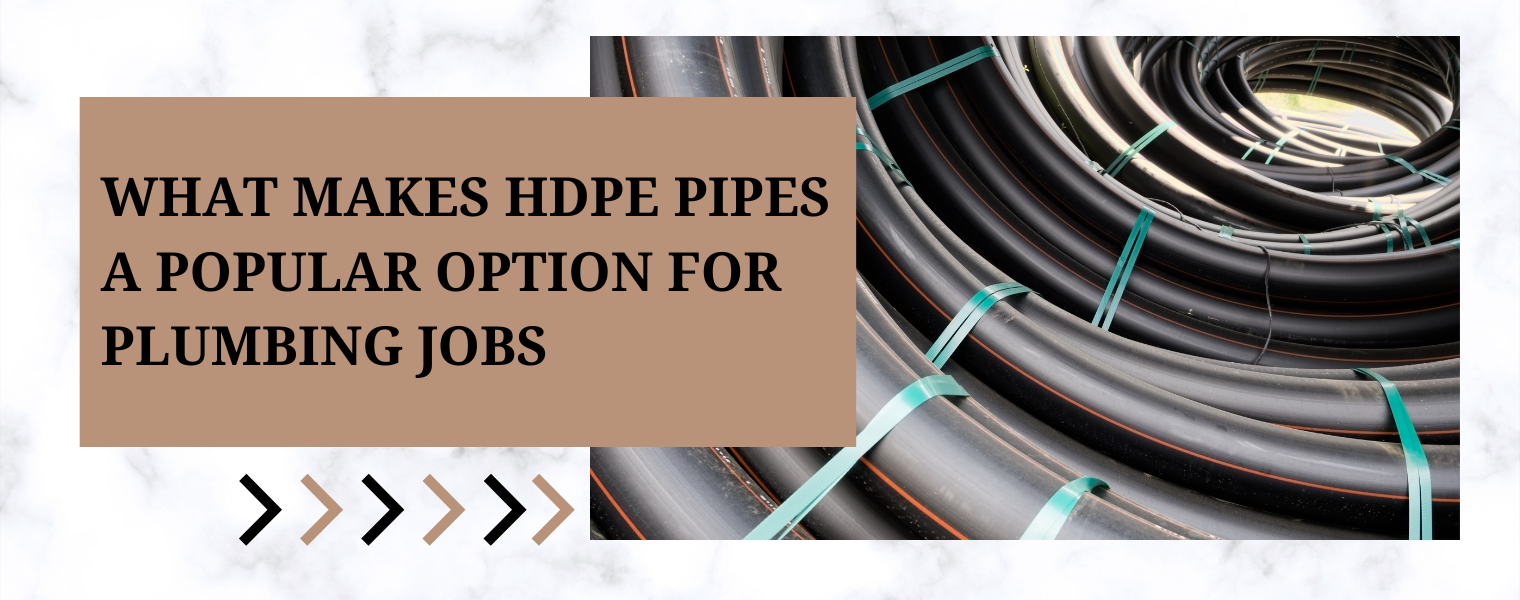
Plastic pipes have dominated an industry that was previously dominated by metal and concrete pipes. However, with over a dozen different types of plastic pipes available, it can be difficult to select the best option for any plumbing requirement. Keeping this in mind, we're discussing HDPE (High-Density Poly-Ethylene) pipes. These pipes are perfect for the jack-of-all-trades category. HDPE fittings can be found in agriculture, commercial, industrial, and residential settings. What distinguishes HDPE pipes? Why are they so popular over other options? Why are HDPE piping systems getting so much attention? All of these questions will be addressed in this article. Let's start here by learning what HDPE pipes are.
HDPE pipes (High-Density Polyethylene) are a type of thermoplastic pipe. These pipes are highly flexible and durable due to their unique manufacturing. These pipes are well-known for their adaptability, as they are used for residential, commercial, industrial, and agricultural purposes. Aside from that, these pipes have distinct properties that distinguish them from PVC and CPVC pipes. Any leading HDPE pipes manufacturer will tell you that HDPE thermoplastic pipes are the go-to piping solution.
Let's look at the unique properties of HDPE pipes that make them so unique and reliable –
While some of these characteristics are shared by other types of plastic pipes, the HDPE piping system is unique in that it combines all of them.
Corrosion-resistant: HDPE pipes do not rust or corrode, they are an excellent choice for the transportation of water, chemicals, gas, sewage, and geothermal plants. These pipes have an advantage over metal pipes due to their corrosion resistance.
Chemically inert and durable: HDPE pipes are preferred over metal pipes as they are chemically inert, which means they do not emit any chemical activity regardless of the material with which they come into contact.
Highly flexible: One of the most distinguishing characteristics of an HDPE pipe is its extreme flexibility. This facilitates the use of the pipe in a variety of industries. The high flexibility is due to the high quality of the materials used and the fact that these pipes are fused using homogeneous welding.
Easy to maintain: These pipes are leak-proof, long-lasting, and resistant to bacteria and fungi because they are corrosion-resistant, chemically inert, and homogeneously fused. As a result, HDPE pipes are long-term cost-effective.
Lightweight but strong: When compared to steel, concrete, and other plastic pipes, these pipes are lighter in weight but stronger, making them an excellent choice for heavy load-bearing applications. This is one of the key features that is allowing leading HDPE Pipe manufacturers to profit handsomely.
Simple to set up: Because these pipes are lightweight and do not require a solvent for joints, they make it simple to quickly install a fantastic HDPE piping system.
Cost-effective: Being light saves money on labor and heavy weight-lifting machines. Another reason why large industries are interested in HDPE piping systems.
High flow rate: HDPE pipes have internal and external surfaces that allow gas and liquid to flow with little to no friction. Solid particles can pass through these pipes with little turbulence.
Recyclable: Unlike most other plastic pipes, HDPE pipes are recyclable and can be easily molded into various shapes. Furthermore, these pipes are environmentally friendly and do not emit toxic gases during production.
Given all of the characteristics listed above, it is no surprise that HDPE piping systems dominate the piping industry. These pipes are widely used in various industries.
Agricultural Usage- HDPE pipes are an excellent choice for irrigation and other agricultural applications because they are corrosion resistant, chemically inert, inhibit germ growth, support high water flow and can withstand high water pressure due to their flexible walls.
Industrial Usage- HDPE pipes are used in a variety of industrial applications, including high-pressure pipelines and the transfer of chemicals, gases, and wastewater.
Household Usage- HDPE pipes are an excellent choice for transporting potable water in residential and commercial settings because they inhibit the growth of bacteria and other germs, keeping the water safe and pure.
Selecting the appropriate HDPE Pipes for your project is important for long-term operational success and value for money. Polyfab always ensures the best deal, regardless of the scope and size of your projects. Contact our sales Polyfab for the pricing details and other important information from our HDPE pipe experts.